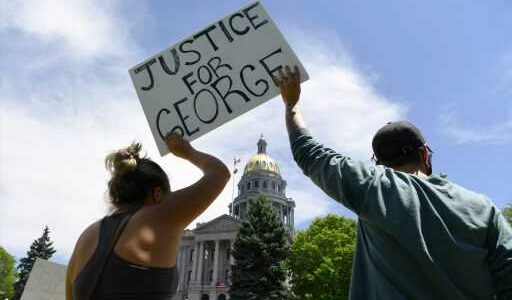
How Colorado lawmakers changed policing in 2021
In their first full legislative session since mass protests over police brutality, Colorado lawmakers passed bills to regulate use of force, expand alternatives to policing and make police actions and discipline more transparent to the public.
There was no sweeping reform bill similar to the one passed in June 2020, but lawmakers, law enforcement and advocacy groups worked to build upon those changes in the six of 10 bills about policing that cleared the Statehouse.
“It’s a little less confrontational than it was last year with our legislature, when we had a complete revamp of our system in 10 days,” said Larimer County Sheriff Justin Smith, chair of the County Sheriffs of Colorado’s legislative committee.
Lawmakers passed bills regulating a controversial method of identifying suspects and banned officers from directing a paramedic to inject someone with ketamine. Another bill ordered research on improving police training for interacting with people with disabilities and would mandate annual training on the topic.
Here’s three more bills that will change policing in Colorado, if signed by the governor.
Funding alternatives to police
Under HB21-1030, Colorado law enforcement, public health agencies and social service providers will have access to $2 million for alternatives to police responses. The bipartisan sponsors of the legislation hope it will encourage cities to create co-responder programs, which pair an officer with a behavioral health professional, and services that send non-police to 911 calls involving mental illness or homelessness, like the expanding STAR program in Denver.
“There’s a recognition that we need help working with the community on mental health issues,” Smith said.
Supporters of the bill hope it will help small and rural communities without the money or resources of the Front Range fund programs. The grant money will also pay for counseling and trauma awareness training for police.
Tracking officers who lie
Prosecutors are legally required to tell defendants whether a police officer testifying against them has a history of lying. But in Colorado, keeping track of those officers has been inconsistent and often hidden from public view, as a Denver Post investigation found in December 2020.
Lawmakers passed SB21-174, which will create standard reasons for why an officer can be labeled as not credible, like tampering with evidence or lying during an internal investigation. The bill also will make the names of the officers public in a database. Previously, each district attorney decided whether the lists were public record; most thought they were not.
Sponsors of the bill thought making the names public was an important act of transparency and did not face much pushback, Colorado Springs GOP Rep. Terri Carver said.
Updates to police reform law
An update to last year’s sweeping police reform legislation closes loopholes in the original bill, like banning the defense of qualified immunity for state-employed highway patrol troopers and Colorado Bureau of Investigation officers.
HB21-1250 prohibits municipalities, like Greenwood Village, from preemptively declaring it will never find any of its officers acted in bad faith, which would make officers personally liable for up to $25,000.
Teams that encompass several law enforcement agencies also would be required to investigate any death caused by an officer’s use of force. Previously, it was only for police shootings, though some jurisdictions requested the teams for other deaths.
The bill requires police agencies to release requested body camera footage within 21 days, beginning on the day Gov. Jared Polis signs the bill. Families of people injured or killed by police deserve to have access to unedited body camera footage in a reasonable amount of time, said Rep. Leslie Herod, a Denver Democrat and lead sponsor of both the 2020 bill and the 2021 follow-up.
“There are families that still don’t have body camera footage for what happened to their loved ones,” she said.
Amendments to the bill focused on transparency. Law enforcement agencies that encrypt their radio traffic, hiding it from the public, are required to work with Colorado news outlets so reporters can access the channels. The bill also removes language from a prior bill that law enforcement agencies used to deny requests for police discipline files.
Source: Read Full Article